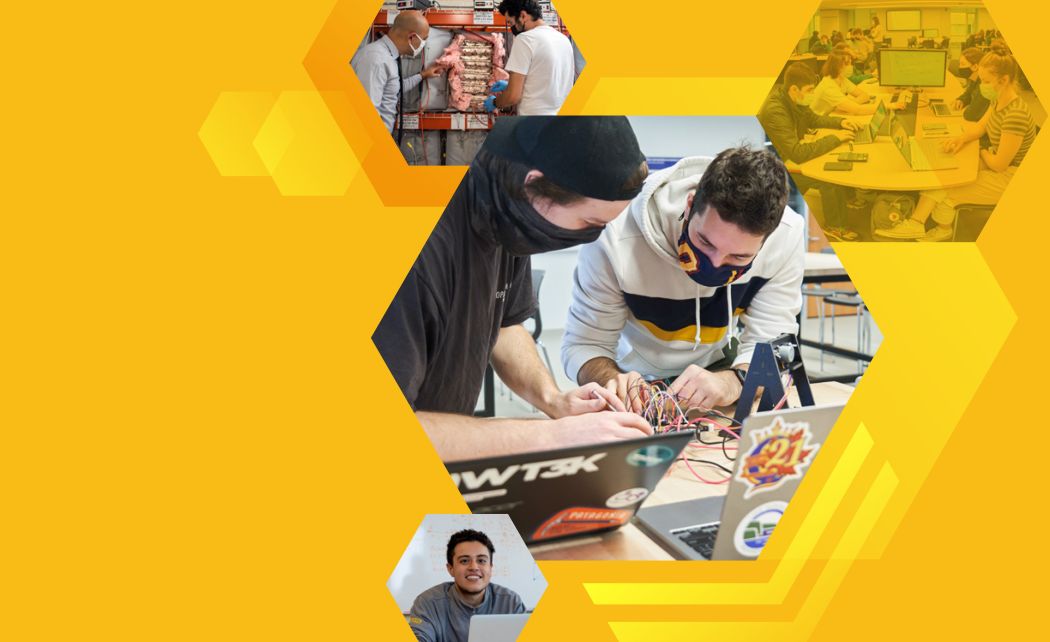
Smith Engineering will ensure that our curriculum prepares students to tackle crucial issues from urban development and land usage, to providing healthcare to remote populations, to mitigating climate change. Our curriculum will be transformed, as will our learning environments, with new learning spaces that emphasize multidisciplinary design and experiential learning environments where creativity and hands-on exploration transform creative thought into practical design.
Our students will be trained to tackle society’s grand challenges – broad, integrative problems of deep societal importance where solutions are imaginable but the path to solutions is unclear. Aligned with the United Nations’ Sustainable Development Goals, these challenges are human challenges: they will inspire and encourage multidisciplinary perspectives from the social sciences and humanities.
Interdisciplinary views of education are essential, as global reviews of engineering education identify silos among disciplines as a major challenge that constrains the development of engineering education.
Smith Engineering will foster its Engineering Teaching and Learning Team (ETLT) to support faculty in the development of an interdisciplinary, relevant and future-focused curriculum.
We will reinvest in and enhance our distinctive and successful philosophy that champions career readiness. Our 12–16 month paid internship program offers students the opportunity to gain valuable work experience, with almost 50% of our current fourth-year class out on internships and the program growing by double digits year over year. We will not cease these efforts until every Smith Engineering student has the benefit of relevant internships, job experiences and experiential leadership opportunities during their education.
Objective 4: Commit to curiosity-driven and challenge-based education
- 4.1 Provide course scenarios that introduce students to SDG-aligned grand challenges that engineers can help solve and ensure they are given the space to experiment through trial and error when working on these issues.
- 4.2 Develop more connections between undergraduate study and research.
- 4.3 Identify key social challenges in the local community, Ontario, Canada, and/or around the world that students and the community can work on collaboratively.
- 4.4 Connect both undergraduate and graduate students to entrepreneurial opportunities.
Objective 5. Enhance Interdisciplinary learning
- 5.1 Investigate the feasibility of an integrated engineering program for students who are interested in a more general and multi-disciplinary curriculum experience.
- 5.2 Investigate and decide on a new interdisciplinary undergraduate program in Biomedical Engineering.
- 5.3 Identify and design integrative course “threads” that provide students with a curated list of courses across disciplines that tackle a common theme, such as addressing an UN SDG.
- 5.4 Integrate data science across our programs, ensuring students learn key skills with multidisciplinary impact as part of their full curriculum.
- 5.5 Commit to reviewing upper-year electives, with the objective of reducing barriers such as pre-requisites, establishing bridging courses that facilitate an overall increase in cross-listed courses that students in different disciplines can take, and offering courses jointly by faculty in different departments.
- 5.6 Expand opportunities to have students take courses outside of Engineering as a core part of their Engineering education, ensuring they are exposed to a breadth of thinking that incorporates ethical, economic and aesthetic values. We will jointly develop courses with other Faculties in areas that speak to global challenges and the UN SDGs.
Objective 6. Expand professional experience options
- 6.1 Attain 100% undergraduate participation in research or industry internships, or other meaningful hands-on learning opportunities, by graduation.
- 6.2 Nurture career-ready graduates through career training that equips students to succeed in an ever-changing and complex world of work. Provide undergraduate and graduate students with enhanced support for work experiences, internships, and careers.
- 6.3 Look for ways to support and expand extra-curricular and professional development opportunities, such as student design teams, conferences, or clubs, while seeking ways to recognize their work through digital badges or micro-credentials.
- 6.4 In addition to the Queen’s Undergraduate Internship Program, develop a range of signature summer experience options with diverse opportunities for students to develop professional skills and gain meaningful work experience in the public, private, and non-profit sectors.
- 6.5 Develop a plan for engaging Queen’s exceptional community of alumni as a key constituency for work-integrated learning experiences.
